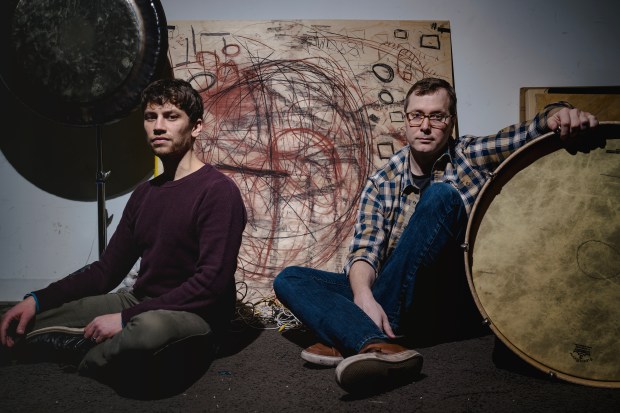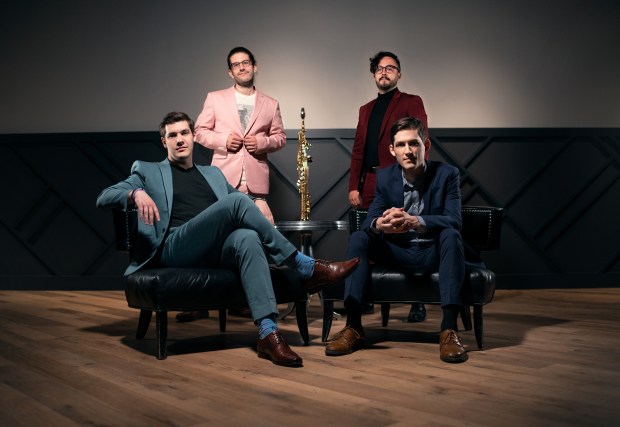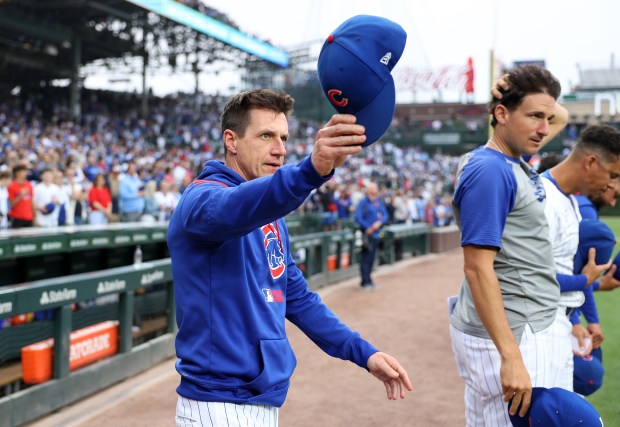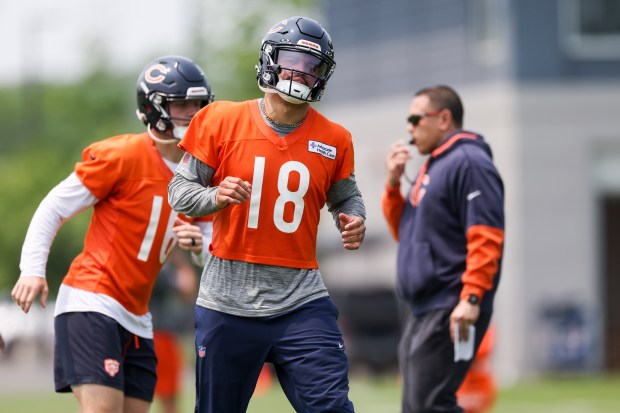For a sampling of sounds, look no further than Frequency Festival, an annual celebration of the musical avant-garde. Curated by Chicago expat Peter Margasak, this year’s iteration, running Feb. 18-23, is as rangy as ever. What other festival could host a Nordic neo-folk artist (Zosha Warpeha, Feb. 20) and experimental turntablist (Mariam Rezaei, Feb. 22) under the same banner, without attendees blinking an eye?
The Tribune spoke to artists performing on three different bills to get a taste of what they’re planning for the festival.
~Nois Saxophone Quartet and Varo String Quartet
When composer Noah Jenkins wrote his “Poetics of Space Translation Symmetry” for saxophone quartet and string quartet, who would play the saxophone parts was never a question. ~Nois, one of the premier saxophone quartets anywhere, lived here in Chicago.
The string quartet casting was dicier. The venturesome Spektral Quartet had just dissolved, leaving a void in the local contemporary music scene.
Since then, the Varo String Quartet — named for the Mexican Surrealist painter Remedios Varo — has emerged as a possible successor. (A disclosure, this reporter is a student of a musician in the quartet.) They team up with ~Nois for the first time in this festival-opening set.
“We’re getting a chance to finally synthesize this monumental work, which couldn’t exist for a long time,” says Julian Velasco, ~Nois saxophonist and artistic director.
“Poetics of Space Translation Symmetry” gives its busiest lines to the string quartet, while the saxophones — four altos, rather than the typical lineup of soprano, alto, tenor and baritone — sustain an “ethereal, formless” texture around them and the audience. “We want to create this homogeneous exterior that the string quartet then lives in,” Velasco says.
Ironically, ~Nois is missing its own alto at present: Hunter Bockes left the group last year. The group will feature its four alto finalists through the rest of the season and expects to announce its newest member sometime in the spring.
Performing on a bill with clarinetists John McCowen and Madison Greenstone, 8:30 p.m. Feb. 18 at Constellation, 3111 N. Western Ave.; tickets $20.
Beyond This Point
What differentiates man from machine? In this percussion duo’s set, the distinction gets slippery. John Corkill and Adam Rosenblatt debut two new pieces by composers Julie Zhu and David Bird, who both use cutting-edge technology to dramatic effect.
Zhu, a painter before she turned her focus to music, previously trained an AI model to predict shapes based on the sound they made as they’re drawn. Her Frequency Festival premiere, “amanuensis,” takes the same cues. The performers draw and write on a 4-by-4-foot wooden plank with charcoal; all the while, contact mics at each corner of the plank amplify the surface sounds on four correlating speakers in the Constellation space.
“The audience will hear it like they’re sitting on top of the board,” says Corkill.

Meanwhile, Bird’s “Hypochondriac” casts Rosenblatt as a Frankensteinish automaton and Corkill as his surgeon. Sensor pads hidden under Rosenblatt’s clothes allow both musicians to trigger Bird’s sound design through movement and touch.
“There’s a sequence of actions we have to take, but we have a little bit of flexibility in how we pace it,” Rosenblatt says.
Performing on a bill with pianist Mabel Kwan, 8:30 p.m. Feb. 19 at Constellation, 3111 N. Western Ave.; tickets $20.
Pat Thomas and Mariam Rezaei
Thomas, a doyen of experimental piano, first heard Rezaei play a solo DJ set. It was unlike any other set he’d heard — Rezaei’s hands were constantly in motion all over her turntables, deftly layering techniques in real-time.
“I just couldn’t believe I was hearing, the way she was manipulating the material,” Thomas says, shaking his head. “It’s not just detailed. It’s the precision. I mean, it’s instrumental skill.”
Not coincidentally, Rezaei does have instrumental skills: she studied piano. That “physicality,” she says, makes her musical partnership with Thomas feel almost psychic.
“The turntable can do many things. As a musician, Pat is very open to that,” Rezaei says. “Often the turntable is seen or perceived with its own stereotype of how it should fit in, how it should sound. For me, it’s more about the turntables being two, three or four instruments, and reacting as if they were those instruments.”
The two first collaborated through Black Top, Thomas’ band with multi-instrumentalist Orphy Robinson, but they began performing together as a duo very recently. A January set in Oxford, England — Thomas’ hometown — was the only prelude to their upcoming Frequency Festival appearance.
At that concert, between Rezaei’s samples of Persian tombak drumming and Middle Eastern ney flute, Thomas was astonished to hear the sound of his own piano, processed and reflected back at him like a fun-house mirror reflection.
“She pushes you. And you want to be constantly pushed by your partner,” he says.
8 p.m. Feb. 22 at the University of Chicago’s Bond Chapel, 1025 E. 58th St.; free admission. For a full lineup and venue information, visit frequencyfestival-chicago.com
Hannah Edgar is a freelance critic.
The Rubin Institute for Music Criticism helps fund our classical music coverage. The Chicago Tribune maintains editorial control over assignments and content.





